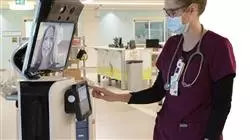University certificate
The world's largest faculty of information technology”
Why study at TECH?
A truly comprehensive specialization for you to lead the revolution in Telemedicine through AI and IoT"

IoT technology enables real-time remote monitoring of patients, which is tremendously useful for individuals with chronic illnesses or those in recovery. Therefore, IoT devices can collect and transmit important health data, such as blood pressure, heart rate and blood glucose, to doctors and other health care professionals. Similarly, AI helps to improve accuracy in the diagnosis and treatment of pathologies by analyzing large amounts of patient data, detecting patterns and relationships that might not be obvious.
These are two important technologies that are having a major impact on Telemedicine, which is why computer scientists are called upon to play a major role. That is why they have a unique opportunity with this Postgraduate certificate, with which they will examine the design of communication protocols in different scenarios in the health field. But this program takes on very comprehensive dyes, since students will analyze IoT communication beyond its application in the e-Health sector.
Additionally, during the program, students will determine the optimization provided by parallelization in GPU-accelerated applications, with an emphasis on application strategies for the health care sector.
All this and more will boost the professional career of the computer scientist through a Virtual Campus with the largest digital library of academic materials in this area. In this sense, with just an Internet connection you will be able to access them in an unlimited way 24 hours a day.
If you want to program algorithms for the treatment and processing of medical images, this is the program for you"
This Postgraduate certificate in Artificial Intelligence and IoT Applications in Telemedicine contains the most complete and updated educational program in the market. It’s most outstanding features are:
- The development of practical cases presented by experts in applications of Artificial Intelligence and IoT to Telemedicine
- The graphic, schematic and eminently practical contents with which it is conceived, collect technological and practical information on those disciplines that are essential for professional practice
- The practical exercises where the self-evaluation process can be carried out to improve learning
- Its special emphasis on innovative methodologies
- Theoretical lessons, questions to the expert, debate forums on controversial topics, and individual reflection assignments
- Content that is accessible from any fixed or portable device with an Internet connection
You will master all the implications of Natural Language Processing in Telemedicine"
The program’s teaching staff includes professionals from sector who contribute their work experience to this program, as well as renowned specialists from leading societies and prestigious universities.
Its multimedia content, developed with the latest educational technology, will allow the professional a situated and contextual learning, that is, a simulated environment that will provide an immersive training programmed to train in real situations.
The design of this program focuses on Problem-Based Learning, in which the professional will have to try to solve the different professional practice situations that will arise throughout the academic course. For this purpose, the student will be assisted by an innovative interactive video system created by renowned experts.
You are 150 hours away from leading IoT implementation plans in patient monitoring and care"

This Postgraduate Certificate will allow you to update on the latest advances in Nanotechnology, analyzing the types of nanorobots that have been emerging"
Syllabus

6 weeks of specialization in which you will delve into a syllabus with all the key components for the personalization of the health care service"
Module 1. Applications of Artificial Intelligence and the Internet of Things (IoT) in Telemedicine
1.1. eHealth Platforms: Personalizing Healthcare Services
1.1.1. e-Health Platforms:
1.1.2. Resources for e-Health Platforms
1.1.3. Digital Europe Program. Digital Europe-4-Health and Horizon Europe
1.2. Artificial Intelligence in Healthcare I: New Solutions in Computer Applications
1.2.1. Remote Analysis of Results
1.2.2. Chatbox
1.2.3. Prevention and Real-Time Monitoring
1.2.4. Preventive and Personalized Medicine in Oncology
1.3. Artificial Intelligence in Healthcare II:
1.3.1. Monitoring Patients with Reduced Mobility
1.3.2. Cardiac Monitoring, Diabetes, Asthma
1.3.3. Health and Wellness Apps
1.3.3.1. Heart Rate Monitors
1.3.3.2. Blood Pressure Bracelets
1.3.4. Ethical Use of AI in the Medical Field. Data Protection
1.4. Artificial Intelligence Algorithms for Image Processing
1.4.1. Artificial Intelligence Algorithms for Image Handling
1.4.2. Image Diagnosis and Monitoring in Telemedicine
1.4.2.1. Melanoma Diagnosis
1.4.3. Limitations and Challenges in Image Processing in Telemedicine
1.5. Application Acceleration using Graphics Processing Units (GPU) in Medicine
1.5.1. Program Parallelization
1.5.2. GPU Operations
1.5.3. Application Acceleration using GPU in Medicine
1.6. Natural Language Processing (NLP) in Telemedicine
1.6.1. Text Processing in the Medical Field. Methodology
1.6.2. Natural Language Processing in Therapy and Medical Records
1.6.3. Limitations and Challenges in Natural Language Processing in Telemedicine
1.7. The Internet of Things (IoT) in Telemedicine. Applications
1.7.1. Monitoring Vital Signs. Wearables
1.7.1.1. Blood Pressure, Temperature, and Heart Rate
1.7.2. The IoT and Cloud Technology
1.7.2.1. Data Transmission to the Cloud
1.7.3. Self-Service Terminals
1.8. IoT in Patient Monitoring and Care
1.8.1. IoT Applications for Emergency Detection
1.8.2. The Internet of Things in Patient Rehabilitation
1.8.3. Artificial Intelligence Support in Victim Recognition and Rescue
1.9. Nano-Robots. Typology
1.9.1. Nanotechnology
1.9.2. Types of Nano-Robots
1.9.2.1. Assemblers. Applications
1.9.2.2. Self-Replicating. Applications
1.10. Artificial Intelligence in COVID-19 Control
1.10.1. COVID-19 and Telemedicine
1.10.2. Management and Communication of Breakthroughs and Outbreaks
1.10.3. Outbreak Prediction in Artificial Intelligence

You will access this course from your favorite electronic device to analyze diagnostic imaging and monitoring in Telemedicine"
Postgraduate Certificate in Artificial Intelligence and IoT Applications in Telemedicine
In today's digital age, the convergence of Artificial Intelligence (AI) and the Internet of Things (IoT) is transforming the way healthcare is delivered and health services are accessed. If you want to be at the forefront of this revolution in the healthcare industry, the Postgraduate Certificate in Artificial Intelligence and IoT Applications in Telemedicine at TECH Global University is your gateway to a future of innovation and growth. Telemedicine, driven by AI and IoT technologies, is revolutionizing the way healthcare professionals connect with patients and deliver personalized diagnoses and treatments. This Postgraduate Certificate gives you the opportunity to explore how these disruptive technologies are changing the healthcare landscape and how you can be part of this transformation.
The best education is here at TECH
In the Postgraduate Certificate in Artificial Intelligence and IoT Applications in Telemedicine, you'll gain in-depth knowledge on how AI and IoT are driving telemedicine, improving diagnosis, patient monitoring, medical data management and clinical decision making. You'll learn how to use advanced tools and platforms to analyze real-time healthcare data and design solutions that benefit both healthcare professionals and patients. If you are excited to be part of the technological revolution in healthcare and want to acquire skills to drive innovation in telemedicine, the Postgraduate Certificate in Artificial Intelligence and IoT Applications in Telemedicine at TECH Global University is the path for you. Join us and get ready to lead change in the world of healthcare.







